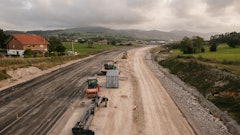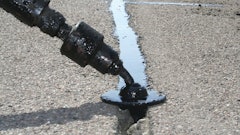Two recent steps by the Pavement Coatings Technology Council (PCTC) continue the organization’s efforts to force an objective examination of claims concerning refined coal tar sealer (RFT) made by the U.S. Geological Survey (USGS).
According to PCTC Executive Director Anne LeHuray, PCTC in March sent a letter to the USGS Office of Enterprise Information asking that the information PCTC requested two years ago through the Freedom of Information Act (FOIA) be provided by USGS.
“PCTC continues to be disappointed in the response of the USGS to our Freedom of Information Act Request,” LeHuray said in May. “The USGS still has not produced much of the data supporting either the chemical mass balance model or the settled house dust study, nor has it produced more than a handful of requested documentation, reviews or correspondence.”
The PCTC letter delineates nine specific FOIA requests PCTC made in April 2011 that as of March 2013 had not been fulfilled. Included are requests for field data, communications among USGS officials involved in the RFT research as well as with the organizations conducting RFT studies, photographs related to studies, and lab notes and field data.
LeHuray said the information that has yet to be produced is crucial for evaluating the USGS finding. “The basic tenet of science is that findings must be based on reproducible experimental results,” LeHuray said. “Reproducibility requires transparency and that basic information about how the USGS conducted its studies be made available: As many have observed, transparency delayed is transparency denied."
In addition to pursuing its FOIA request, PCTC filed a Data Quality Act petition in May concerning an article, Coal Tar Sealant Largest Source of PAHs in Lakes, and a related press release, both available on the USGS website.
According to the letter, PCTC is requesting “correction of information disseminated by USGS.” The request is made pursuant to USGS Information Quality Guidelines and the U.S. Dept. of the Interior and Office of management and Budget (OMB).
PCTC writes that among other concerns, the article “represents yet another breach in USGS Guidelines, especially when it comes at the expense of ignoring contrary scientific research, thereby misleading the public into thinking that there is a consensus on this issue within the scientific community when there clearly is not.”
The PCTC petition points out that by ignoring and not citing related peer-reviewed research on the coal tar sealer topic, particularly research the contradicts USGS claims, the USGS violates its own mandate which requires “impartiality and non-advocacy.”
“It goes without saying,” the letter continues, “that a refusal to acknowledge or cite peer-reviewed articles that take a position contrary to the USGS’ own research is a form of advocacy that clearly lacks objectivity.”
PCTC writes that another way to determine “if any bias or advocacy exists in USGS” on RFT issues is for USGS to produce all data and correspondence related to the RFT issue. PCTC points out that USGS has responded selectively to the 2011 FOIA request, “withholding, at least up to now, certain correspondence and e-mail between the USGS staff and other individuals outside the agency who have made it their goal to ban coal tar sealants across the country.”
“These efforts by the USGS to withhold certain documents are not only at odds with [USGS] policies, but also are contrary to the need for transparency that is emphasized throughout the USGS Guidelines.”
Following specific examples of purported USGS bias, PCTC asks that USGS remove the “Coal Tar Sealant Largest Source of PAHs in Lakes” article and related press release from its NAWQA website.
“Any failure to do so will adversely affect those members of the PCTC who distribute or apply coal tar sealants since consumers and legislators who are asked to consider the merits of proposed sealant bans are being misled by unproven hypotheses and flawed ‘conclusions’ offered by the USGS in these website publications.”
PCTC adds that at the very least USGS should include citations to peer-reviewed articles and publications that have “respectfully and scientifically challenged the findings” of the USGS “coal tar sealant” articles.
“An alternative solution is to delete the website altogether so the public does not mistakenly believe that it reflects an impartial and complete collection of all relevant scientific literature regarding coal tar sealcoating. Clearly the USGS website has failed in that regard.”


























